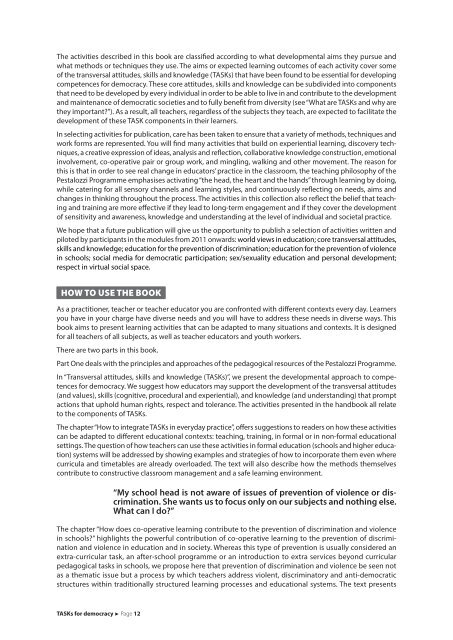TASKs for democracy
4NYw4W
4NYw4W
Create successful ePaper yourself
Turn your PDF publications into a flip-book with our unique Google optimized e-Paper software.
The activities described in this book are classified according to what developmental aims they pursue and<br />
what methods or techniques they use. The aims or expected learning outcomes of each activity cover some<br />
of the transversal attitudes, skills and knowledge (<strong>TASKs</strong>) that have been found to be essential <strong>for</strong> developing<br />
competences <strong>for</strong> <strong>democracy</strong>. These core attitudes, skills and knowledge can be subdivided into components<br />
that need to be developed by every individual in order to be able to live in and contribute to the development<br />
and maintenance of democratic societies and to fully benefit from diversity (see“What are <strong>TASKs</strong> and why are<br />
they important?”). As a result, all teachers, regardless of the subjects they teach, are expected to facilitate the<br />
development of these TASK components in their learners.<br />
In selecting activities <strong>for</strong> publication, care has been taken to ensure that a variety of methods, techniques and<br />
work <strong>for</strong>ms are represented. You will find many activities that build on experiential learning, discovery techniques,<br />
a creative expression of ideas, analysis and reflection, collaborative knowledge construction, emotional<br />
involvement, co-operative pair or group work, and mingling, walking and other movement. The reason <strong>for</strong><br />
this is that in order to see real change in educators’ practice in the classroom, the teaching philosophy of the<br />
Pestalozzi Programme emphasises activating “the head, the heart and the hands” through learning by doing,<br />
while catering <strong>for</strong> all sensory channels and learning styles, and continuously reflecting on needs, aims and<br />
changes in thinking throughout the process. The activities in this collection also reflect the belief that teaching<br />
and training are more effective if they lead to long-term engagement and if they cover the development<br />
of sensitivity and awareness, knowledge and understanding at the level of individual and societal practice.<br />
We hope that a future publication will give us the opportunity to publish a selection of activities written and<br />
piloted by participants in the modules from 2011 onwards: world views in education; core transversal attitudes,<br />
skills and knowledge; education <strong>for</strong> the prevention of discrimination; education <strong>for</strong> the prevention of violence<br />
in schools; social media <strong>for</strong> democratic participation; sex/sexuality education and personal development;<br />
respect in virtual social space.<br />
HOW TO USE THE BOOK<br />
As a practitioner, teacher or teacher educator you are confronted with different contexts every day. Learners<br />
you have in your charge have diverse needs and you will have to address these needs in diverse ways. This<br />
book aims to present learning activities that can be adapted to many situations and contexts. It is designed<br />
<strong>for</strong> all teachers of all subjects, as well as teacher educators and youth workers.<br />
There are two parts in this book.<br />
Part One deals with the principles and approaches of the pedagogical resources of the Pestalozzi Programme.<br />
In “Transversal attitudes, skills and knowledge (<strong>TASKs</strong>)”, we present the developmental approach to competences<br />
<strong>for</strong> <strong>democracy</strong>. We suggest how educators may support the development of the transversal attitudes<br />
(and values), skills (cognitive, procedural and experiential), and knowledge (and understanding) that prompt<br />
actions that uphold human rights, respect and tolerance. The activities presented in the handbook all relate<br />
to the components of <strong>TASKs</strong>.<br />
The chapter “How to integrate <strong>TASKs</strong> in everyday practice”, offers suggestions to readers on how these activities<br />
can be adapted to different educational contexts: teaching, training, in <strong>for</strong>mal or in non-<strong>for</strong>mal educational<br />
settings. The question of how teachers can use these activities in <strong>for</strong>mal education (schools and higher education)<br />
systems will be addressed by showing examples and strategies of how to incorporate them even where<br />
curricula and timetables are already overloaded. The text will also describe how the methods themselves<br />
contribute to constructive classroom management and a safe learning environment.<br />
“My school head is not aware of issues of prevention of violence or discrimination.<br />
She wants us to focus only on our subjects and nothing else.<br />
What can I do?”<br />
The chapter “How does co-operative learning contribute to the prevention of discrimination and violence<br />
in schools?” highlights the powerful contribution of co-operative learning to the prevention of discrimination<br />
and violence in education and in society. Whereas this type of prevention is usually considered an<br />
extra-curricular task, an after-school programme or an introduction to extra services beyond curricular<br />
pedagogical tasks in schools, we propose here that prevention of discrimination and violence be seen not<br />
as a thematic issue but a process by which teachers address violent, discriminatory and anti-democratic<br />
structures within traditionally structured learning processes and educational systems. The text presents<br />
<strong>TASKs</strong> <strong>for</strong> <strong>democracy</strong> Page 12


